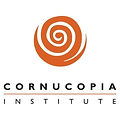Statements from Supporting Organizations
National Standards Board (NOSB)
Observing the framework of organic farming based on its foundation of sound management of soil biology and ecology, it becomes clear that systems of crop production that eliminate soil from the system, such as hydroponics or aeroponics, can not be considered as examples of accept able organic farming practices.
National Organic Coalition (NOC)
Many soilless systems, including hydroponics, represent the antithesis of organic production systems because they aim to diminish the ecological complexity of the natural production systems. By reducing the living organisms in a hydroponic system to solely the crop, the ecological balance is lost. Such a ‘system’ merely feeds the crop with simple inputs of "required" nutrients. On the other hand, some soilless crop production that is part of a complex ecological system may fit the definition of organic as laid out in the Rule (for example, transplants which eventually are planted in soil, or a system of aquaponics that cycles nutrients from fish through plants and back, and adds wormcastings and compost). Until a clear definition has been provided by the NOP, certifiers should not be allowed to certify hydroponic systems.
U.S. Department of Agriculture
In 1980, the USDA published a Report and Recommendations on Organic Farming. Beginning with the foreward, and continuing throughout the report, soil is given a prominent place at the origin of the USDA's involvement with organic agriculture.
Agrarian Elders
We all have based our organic farming practices on improving soil fertility through fostering the proliferation of the proper soil biology with their accompanying ecologies. Soilless organic farming neglects and ignores these key goals and practices which are at the heart of our work.
We feel it is unacceptable for the USDA/NOP to ignore the NOSB public process that was established, and to make decisions without public hearings. We do not support the NOP in it allowing certifying agencies to certify soilless production. We feel this is a dangerous precedent and that it needs to be stopped.
Cornucopia Institute
Regulations specific to hydroponic systems are needed. At this time, hydroponic systems are allowed, even if the organic production method is merely input-substitution. For example, commercial hydroponic operations rely completely on synthetic fertilizers. Replacing those synthetic fertilizers with natural materials is a form of input-substitution; it does not create an ecological system.
The NOSB, and in fact the entire organic community, needs to come to agreement on what type of hydroponic system are acceptable for organic production. In addition, since there is some disagreement over whether hydroponics should be certified organic, the organic certificate should clearly indicate which crops are hydroponically grown.
International Foundation of Organic Agriculture (IFOAM)
Our longstanding position on organic production is that terrestrial crops must be grown in soil. We write in full support of the NOSB recommendation, which is reproduced at the end of this comment. We ask the NOSB and NOP to instruct the new task force that this NOSB recommendation should be the basis for its deliberation and further recommendations. We also ask the NOP to now base its oversight of accredited certification bodies on this NOSB recommendation.
Organic Seed Growers & Trade Association (OSGATA)
The Board of Directors of Organic Seed Growers and Trade Association (OSGATA), the farmer-run national trade organization, supports opposition to hydroponics in Certified Organic production. It is absolutely clear organic production traditionally has been, and must be, soil-based. OSGATA urges resistance to the concept of hydroponics in Certified Organic production. OSGATA will provide both written and oral comments on this issue at the NOSB upcoming meeting in Stowe, Vermont.

Organic Crop Improvement Association (OCIA)
We are the Board of Directors of the Organic Crop Improvement Association (OCIA). We represent the producer, processor, and handler members of the Organic Crop Improvement Association International. OCIA functions in the United States as a network of chapter and direct members, and as a USDA National Organic Program accredited certification agency (ACA), that provides certification services to more than 9,000 people in North, Central, and South America, as well as Asia.

European Union
This is a letter sent to the USDA by European Parliament member Lidia Senra Rodriguez documenting the current EU position that hydroponics have no place in organic. Efforts are underway to exclude the small amount of hydroponic production currently allowed in the Scandinavian countries so that standards are aligned across Europe. There are also efforts being made to renegotiate the trade treaty with the US in order to exclude USDA certified hydro from being imported as organic to the EU. Click here to read the full letter.
We have received many statements of support for keeping the soil in organic growing. Over 1600 people have signed the petitions. These are just a few of their voices.








